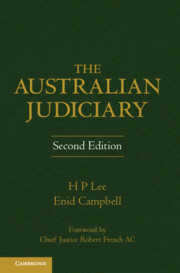Book contents
- Frontmatter
- Contents
- Preface
- Acknowledgments
- Table of Cases
- Table of Statutes
- Chapter 1 Introduction
- Chapter 2 The courts and judges
- Chapter 3 The judiciary as a branch of government
- Chapter 4 Appointment and conditions of service
- Chapter 5 Removal, suspension and discipline of judges
- Chapter 6 Judicial conduct
- Chapter 7 Extra-judicial activities of judges
- Chapter 8 Protecting judicial institutions
- Chapter 9 The accountability of judges
- Chapter 10 A public trust
- Appendix 1 Judicial statistics tables
- Guide to Judicial Conduct
- Index
- References
Chapter 8 - Protecting judicial institutions
Published online by Cambridge University Press: 05 December 2012
- Frontmatter
- Contents
- Preface
- Acknowledgments
- Table of Cases
- Table of Statutes
- Chapter 1 Introduction
- Chapter 2 The courts and judges
- Chapter 3 The judiciary as a branch of government
- Chapter 4 Appointment and conditions of service
- Chapter 5 Removal, suspension and discipline of judges
- Chapter 6 Judicial conduct
- Chapter 7 Extra-judicial activities of judges
- Chapter 8 Protecting judicial institutions
- Chapter 9 The accountability of judges
- Chapter 10 A public trust
- Appendix 1 Judicial statistics tables
- Guide to Judicial Conduct
- Index
- References
Summary
Lord Diplock, an eminent English judge, once observed that:
. . . in any civilised society it is a function of government to maintain courts of law to which its citizens can have access for the impartial decision of disputes as to their legal rights and obligations towards one another individually and towards the state as representing society as a whole. The provision of such a system for the administration of justice by courts of law and the maintenance of public confidence in it, are essential if citizens are to live together in peaceful association with one another.
What is required to maintain public confidence in a judicial system will depend to some extent on what members of the public expect of that system and whether they perceive that their expectations of it are generally fulfilled. Lord Diplock identified three essential requirements for the due administration of justice by courts. They were:
. . . first that all citizens should have unhindered access to the constitutionally established courts of criminal or civil jurisdiction for the determination of disputes as to their legal rights and liabilities; secondly, that they should be able to rely upon obtaining in the courts the arbitrariment of a trial which is free from bias against any party and whose decision will be based only upon those facts which have been proved in evidence adduced before it in accordance with the procedure adopted in courts of law; and thirdly that, once the dispute has been submitted to a court of law, they should be able to rely upon there being no usurpation by any other person of the function of that court to decide it according to law.
For a long time, law-makers have recognised that if the courts of law are to function in the ways expected of them, and also command the confidence of the public they serve, the law must afford to the judges, and to other participants in judicial proceedings, certain protections against conduct which is, or can be, detrimental to the due administration of justice. This chapter is concerned with the legal protections accorded to judicial officers. It deals with aspects of the law of contempt of court and several aspects of the criminal law relating to the administration of justice. The chapter also examines the protections against legal liabilities that are accorded to judges in respect of their actions as judges. Finally, the chapter considers some constitutional constraints on removal of jurisdiction from the courts.
- Type
- Chapter
- Information
- The Australian Judiciary , pp. 207 - 248Publisher: Cambridge University PressPrint publication year: 2012

